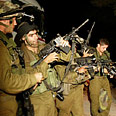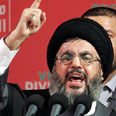

The withdrawal from Lebanon has been completed - Israel Defense Forces soldiers have redeployed along the international border between Israel and Lebanon and are preparing for possible attacks – a real test for the shaky ceasefire.
The Northern Command estimates that the coming months will be quiet as Hizbullah is busy with rearming and restructuring its forces after the war.
"We are likely to fall on protests, gatherings, and shepherds or unarmed individuals who lost their way," a senior officer said.
"That would be the first sign of Hizbullah's awakening, as that's how they test the ground, check the response and collect intelligence. Hizbullah never acted in a coincidental manner, as no operation was coincidental or without preplanning, including the kidnappings. If we see innocent people returning to the border, that would be a red light as far as we are concerned."
The army estimates that the political echelon shares its position that Hizbullah should not be allowed to return to the border.
Should the United Nations peacekeeping force and the Lebanese Army fail to prove their determination, the IDF could act: "At the moment that's not on the agenda, but if we have to, we are likely to see in Lebanon a mode of operation similar to that in the Gaza Strip after the kidnapping of Gilad Shalit, such as incursions into Lebanese territories under aerial cover to carry out pinpoint operations to thwart threats."
The army wants to convey a message that the its top priority is to prevent Hizbullah from regrouping and carrying out attacks.
Talks with Abbas on agenda
On the political front, sources said that Palestinian President Mahmoud Abbas "is Israel's strategic partner. It is clear to us and to the world that a solution to the Israel-Palestinian dispute through Mahmoud Abbas is the next step Israel should take."
The decision to reopen the Palestinian channel after the withdrawal from Lebanon has been gaining momentum in Jerusalem, but some have voiced skepticism that a violent confrontation with Palestinian armed groups is inevitable.
After the withdrawal from Lebanon, Prime Minister Ehud Olmert would have been happy to meet his Lebanese counterpart Fouad Siniora. But this option is not on the agenda at the moment, at least not for Mr. Siniora.
It is an issue that hasn't ripened in the mind of a politician whose ideologically pro-western but who is politically weak.
Despite the great losses suffered by Hizbullah during the war, the group is still feared at home and holds sway over internal affairs.
US Secretary of State Condoleezza Rice is set to meet the foreign ministers of moderate Arab states in Cairo this week to form a coalition against Iran.
"In this war an old conception has been broken according to which a Muslim cannot oppose Iran, Hizbullah, Hamas or any other Islamic body. We have to make this play in our favor," an Israeli official said.
Israel also believes that the war against Hizbullah tipped European policy on the Middle East in favor of Israel as evident in Europe's significant contribution of troops to the peacekeeping mission in Lebanon under UN Resolution 1701, which ended the fighting.
Ronny Sofer contributed to the report















